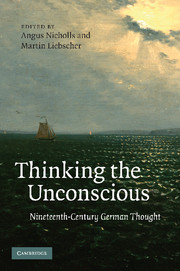Book contents
- Frontmatter
- Contents
- Notes on contributors
- Introduction: thinking the unconscious
- 1 The unconscious from the Storm and Stress to Weimar classicism: the dialectic of time and pleasure
- 2 The philosophical significance of Schelling's conception of the unconscious
- 3 The scientific unconscious: Goethe's post-Kantian epistemology
- 4 The hidden agent of the self: towards an aesthetic theory of the non-conscious in German romanticism
- 5 The real essence of human beings: Schopenhauer and the unconscious will
- 6 Carl Gustav Carus and the science of the unconscious
- 7 Eduard von Hartmann's Philosophy of the Unconscious
- 8 Gustav Theodor Fechner and the unconscious
- 9 Friedrich Nietzsche's perspectives on the unconscious
- 10 Freud and nineteenth-century philosophical sources on the unconscious
- Epilogue: the “optional” unconscious
- Works cited
- Index
- References
1 - The unconscious from the Storm and Stress to Weimar classicism: the dialectic of time and pleasure
Published online by Cambridge University Press: 04 August 2010
- Frontmatter
- Contents
- Notes on contributors
- Introduction: thinking the unconscious
- 1 The unconscious from the Storm and Stress to Weimar classicism: the dialectic of time and pleasure
- 2 The philosophical significance of Schelling's conception of the unconscious
- 3 The scientific unconscious: Goethe's post-Kantian epistemology
- 4 The hidden agent of the self: towards an aesthetic theory of the non-conscious in German romanticism
- 5 The real essence of human beings: Schopenhauer and the unconscious will
- 6 Carl Gustav Carus and the science of the unconscious
- 7 Eduard von Hartmann's Philosophy of the Unconscious
- 8 Gustav Theodor Fechner and the unconscious
- 9 Friedrich Nietzsche's perspectives on the unconscious
- 10 Freud and nineteenth-century philosophical sources on the unconscious
- Epilogue: the “optional” unconscious
- Works cited
- Index
- References
Summary
Nature! We are surrounded and embraced by her – powerless to leave her and powerless to enter her more deeply. Unasked and without warning she sweeps us away in the round of her dance and dances on until we fall exhausted from her arms. She brings forth ever new forms: what is there, never was; what was, never will return. All is new, and yet forever old. We live within her, and are strangers to her. She speaks perpetually with us, and does not betray her secret.
Thus begins, in what could be read as a vivid evocation of the intertwining of the twin forces of Eros and Thanatos, the fragmentary text “On Nature,” the text – allegedly written by Goethe – that made Freud, or so he later claimed, decide to study, not law, but medicine, after he had heard it read at a public lecture by Carl Brühl (1820–99).
At the opening of this volume, which takes us on a chronological journey – from Schelling, the late Goethe, and romanticism, via Schopenhauer, Carl Gustav Carus, Eduard von Hartmann, Gustav Theodor Fechner, to Nietzsche and Freud – through the concept of the unconscious in nineteenth-century German thought, where should one begin? The history of the concept of the unconscious reveals itself to be a complex and much-contested one, and the story of that complexity and contestation has been told by a variety of narrators.
- Type
- Chapter
- Information
- Thinking the UnconsciousNineteenth-Century German Thought, pp. 26 - 56Publisher: Cambridge University PressPrint publication year: 2010
References
- 1
- Cited by



